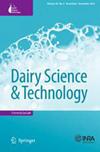Differences in the Proteolytic System of Lactic Acid Bacteria Affect the Release of DPP-IV Inhibitory Peptides from Whey Proteins
Q2 Agricultural and Biological Sciences
引用次数: 0
Abstract
This work analyzed the antidiabetic activity of peptides from whey proteins after hydrolysis by Lactobacillus rhamnosus GG and Streptococcus thermophilus SY-102, emphasizing the differences between the proteolytic systems of both bacteria. Peptide fractions from whey proteins may have biological functions, such as antidiabetic functions, which inhibit the DPP-IV enzyme, and lactic acid bacteria could release them. A whey solution of 10% was fermented with selected lactic acid bacteria in monoculture and coculture, analyzing kinetic parameters and the proteolytic profile, using the 2,4,6-trinitrobenzene sulfonic acid technique for free amino groups’ determination and Tris-tricine polyacrylamide gel electrophoresis. An in vitro inhibition assay of the DPP-IV enzyme was used. The kinetic parameters showed a faster duplication rate in the monoculture with L. rhamnosus GG than in the co-culture, which was related to lactic acid production. Co-culture does not have the highest production of free amino groups and peptides. Still, peptide fractions with lower molecular weight (<2 kDa) were found and showed a high DPP-IV inhibitory capacity that was maintained from the middle of the fermentation to the end (55.4%). In comparison, the monoculture of L. rhamnosus GG increased from 0 to 63.3%. This demonstrates that the proteolytic capacity and the proteolytic system of each lactic acid bacteria determine the structure of the released peptides.乳酸菌蛋白水解系统的差异影响乳清蛋白中DPP-IV抑制肽的释放
本研究分析了鼠李糖乳杆菌GG和嗜热链球菌SY-102水解乳清蛋白后肽的抗糖尿病活性,强调了两种细菌蛋白水解系统的差异。乳清蛋白的肽部分可能具有抑制DPP-IV酶的生物功能,如抗糖尿病功能,乳酸菌可以释放它们。选择乳酸菌对乳清溶液进行单培养和共培养发酵,利用2,4,6-三硝基苯磺酸法测定游离氨基和三-三辛聚丙烯酰胺凝胶电泳,分析乳清溶液的动力学参数和蛋白水解谱。对DPP-IV酶进行体外抑制实验。动力学参数表明,与鼠李糖GG单培养的重复率比共培养的快,这与乳酸的产生有关。共培养并没有产生最高的游离氨基和多肽。此外,还发现了分子量较低的肽段(<2 kDa),并且从发酵中期到发酵结束都保持了较高的DPP-IV抑制能力(55.4%)。相比之下,单栽培鼠李糖GG从0增加到63.3%。这表明,每种乳酸菌的蛋白水解能力和蛋白水解系统决定了所释放肽的结构。
本文章由计算机程序翻译,如有差异,请以英文原文为准。
求助全文
约1分钟内获得全文
求助全文
来源期刊

Dairy Science & Technology
农林科学-食品科技
CiteScore
2.30
自引率
0.00%
发文量
0
审稿时长
2 months
期刊介绍:
Information not localized
 求助内容:
求助内容: 应助结果提醒方式:
应助结果提醒方式:


